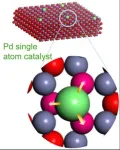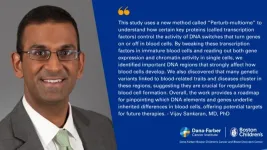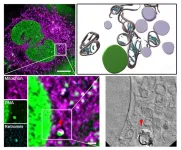(Press-News.org) DALLAS and MINNEAPOLIS, April 4, 2025 — The American Academy of Neurology and the American Heart Association have awarded the 2025 Ralph L. Sacco Scholarships for Brain Health to two researchers, Hortense Triniac, Ph.D., of Milwaukee and Katy Walsh, Ph.D., of Boston. Each will receive a $150,000 two-year scholarship to support continuing scientific research in brain health. This is the second year this scholarship has been awarded.
The Ralph L. Sacco Scholarships in Brain Health, also known as the Sacco Scholars program, are made possible by a generous bequest to the American Academy of Neurology, the world’s largest association of neurologists and neuroscience professionals and experts in brain health and the American Heart Association, a global force changing the future of health for all, from the late Ralph L. Sacco, M.D., M.S., FAAN, FAHA. Sacco was the only neurologist to have served as president of both organizations. He passed away in 2023 from a brain tumor.
“There is a critical need for growing the body of science related to how vascular disease impacts cognitive decline, dementia and brain health more broadly,” said Keith Churchwell, M.D., FAHA, American Heart Association volunteer president, an associate clinical Professor of Medicine at Yale School of Medicine in New Haven, Connecticut and adjunct Associate Professor of Medicine at the Vanderbilt School of Medicine in Nashville, Tennessee. “We look forward to seeing the work of these two scholars as these research projects build upon Dr. Sacco’s decades of work in saving and improving lives.”
“It is an honor to award two new Ralph L. Sacco Scholarships in Brain Health as we build a strong community of researchers dedicated to scientific discovery," said American Academy of Neurology President Carlayne E. Jackson, M.D., FAAN. "By accelerating research, we can achieve scientific breakthroughs that enhance brain health at every stage of life, improving brain health for all.”
Triniac is a postdoctoral fellow in the Zheng Laboratory of the Versiti Blood Research Institute and Medical College of Wisconsin in Milwaukee. She is being awarded the scholarship to study whether the risk of a stroke may be reduced by specific interactions of several types of proteins – apolipoprotein B (apoB) and tissue-type plasminogen activator (tPA) – both of which are naturally produced in the liver. The apoB-containing lipoproteins produce low-density lipoprotein (LDL, the so-called “bad” cholesterol) when they enter the bloodstream, which may induce a chronic inflammatory response that can lead to plaque build-up and clots in the arteries. The tPA protein breaks down blood clots to allow blood to flow. Zheng Lab’s previous studies showed that tPA lowers the lipidation of apoB and the production of very low density lipoprotein (VLDL) in the liver cells and when there are higher concentrations of tPA, there are lower levels of VLDL and LDL in the blood. Triniac’s new research will look at whether liver tPA lowers the risk of stroke by reducing lipid accumulation in blood vessels and improving blood clot breakdown. This research may lead to new therapies that reduce the risk of stroke and improve brain health.
Walsh is a postdoctoral research fellow in the Kozberg Lab at Massachusetts General Hospital and Harvard Medical School in Boston. Her research project will include investigating mechanisms of cerebral amyloid angiopathy (CAA), caused when abnormal proteins build up in blood vessels in the brain, often leading to a bleeding stroke. There are currently no treatments available to patients with CAA, the strokes are often deadly and it is a leading cause of cognitive impairment in the elderly. Variations in human DNA in apolipoprotein E (APOE), a protein that helps the brain function by managing the movement of cell building blocks, may alter a person’s risk of developing CAA. Walsh will be studying a recently identified rare APOE variant that may improve blood vessel function to remove the protein waste that builds up in the brain. This study may significantly improve the understanding of factors contributing to CAA pathology and potentially lead to novel therapeutic strategies for patients.
“The Sacco Scholars program is helping address the critical need for funding for early career researchers while also advancing the AAN’s mission of promoting brain health for all—from a person’s earliest years of development to their oldest years,” said AAN Chief Executive Officer Mary E. Post, M.B.A., CAE. “In an era where cognitive well-being is increasingly recognized as paramount to overall health, we are proud of this program that aims to improve lives and make a meaningful contribution to the landscape of brain health.”
“Dr. Ralph Sacco was a dear personal friend and served for more than 20 years as a dedicated volunteer for the American Heart Association. He was the first neurologist to ever serve as our volunteer president and was a champion for our work recognizing the importance of brain health,” said Nancy Brown, the American Heart Association’s chief executive officer. “He was also a valued mentor to many young scientists. It is heartening to see that his legacy of influencing the careers of countless physicians, researchers and healthcare professionals continues through this unique scholarship program.”
Triniac and Walsh begin their two-year research projects on July 1, 2025.
###
About the American Heart Association
The American Heart Association is a relentless force for a world of longer, healthier lives. Dedicated to ensuring equitable health in all communities, the organization has been a leading source of health information for more than one hundred years. Supported by more than 35 million volunteers globally, we fund groundbreaking research, advocate for the public’s health, and provide critical resources to save and improve lives affected by cardiovascular disease and stroke. By driving breakthroughs and implementing proven solutions in science, policy, and care, we work tirelessly to advance health and transform lives every day. Connect with us on heart.org, Facebook, X or by calling 1-800-AHA-USA1.
About the American Academy of Neurology
The American Academy of Neurology is the leading voice in brain health. As the world’s largest association of neurologists and neuroscience professionals with more than 40,000 members, the AAN provides access to the latest news, science and research affecting neurology for patients, caregivers, physicians and professionals alike. The AAN’s mission is to enhance member career fulfillment and promote brain health for all. A neurologist is a doctor who specializes in the diagnosis, care and treatment of brain, spinal cord and nervous system diseases such as Alzheimer's disease, stroke, concussion, epilepsy, Parkinson's disease, multiple sclerosis, headache and migraine. Explore the latest in neurological disease and brain health, from the minds at the AAN at AAN.com or find us on Facebook, X, Instagram, LinkedIn, and YouTube.
END
Two scientific researchers to receive 2025 Ralph L. Sacco Scholarships for Brain Health
American Academy of Neurology and American Heart Association award $150,000 scholarships to researchers from Massachusetts and Wisconsin
2025-04-04
ELSE PRESS RELEASES FROM THIS DATE:
Researchers improve chemical reaction that underpins products from foods to fuels
2025-04-04
CORVALLIS, Ore. – A chemical reaction that’s vital to a range of commercial and industrial goods may soon be initiated more effectively and less expensively thanks to a collaboration that included Oregon State University College of Engineering researchers.
The study, published in Nature, involves hydrogenation – adding the diatomic hydrogen molecule, H2, to other compounds.
“Hydrogenation is a critical and diverse reaction used to create food products, fuels, commodity chemicals and pharmaceuticals,” ...
Texas Tech to develop semiconductor power devices through $6 million grant
2025-04-04
Summary:
Texas Tech University’s Edward E. Whitacre Jr. College of Engineering has secured a $6 million U.S. Department of Defense grant to develop advanced semiconductor materials and devices, particularly for high-power electronics and optoelectronics. The project aims to enhance the performance of wide and ultra-wide bandgap semiconductors, leading to more reliable, high-performance electronics for military applications.
Why This Matters:
Technology Advancement: The research will improve the development of high-performance, high-power electronic devices critical for modern technologies.
Military/Defense Applications: The project targets key military systems, ...
Novel genomic screening tool enables precision reverse-engineering of genetic programming in cells
2025-04-04
RESEARCH SUMMARY
Novel genomic screening tool enables precision reverse-engineering of genetic programming in cells
Study Title: Transcription factor networks disproportionately enrich for heritability of blood cell phenotypes
Publication: Science
Corresponding Dana-Farber Cancer Institute authors: Alexis Caulier, MD, PhD, Vijay Sankaran, MD, PhD
Summary: Collaborative research led by investigators at Dana-Farber/Boston Children's Cancer and Blood Disorders Center defines a ...
Hot Schrödinger cat states created
2025-04-04
Quantum states can only be prepared and observed under highly controlled conditions. A research team from Innsbruck, Austria, has now succeeded in creating so-called hot Schrödinger cat states in a superconducting microwave resonator. The study, recently published in Science Advances, shows that quantum phenomena can also be observed and used in less perfect, warmer conditions.
Schrödinger cat states are a fascinating phenomenon in quantum physics in which a quantum object exists simultaneously in two different states. In Erwin Schrödinger's thought experiment, it is a cat that is alive ...
How cells repair their power plants
2025-04-04
Damage to the genetic material of mitochondria – the mitochondrial DNA or mtDNA for short – can lead to diseases such as Parkinson’s, Alzheimer’s, amyotrophic lateral sclerosis (ALS), cardiovascular diseases and type 2 diabetes. Such damage also speeds up the ageing process. However, the cells are normally capable of identifying such damage and reacting.
Scientists from University Hospital Düsseldorf and HHU have – in collaboration with the University of Cologne and the Center for Molecular Medicine Cologne (CMMC) – discovered a mechanism, which protects and repairs the mitochondria. The research ...
Oxygen is running low in inland waters—and humans are to blame
2025-04-04
Rivers, streams, lakes, and reservoirs aren’t just scenic parts of our landscape—they’re also vital engines for life on Earth. These inland waters ‘breathe’ oxygen, just like we do. But a new study led by Utrecht University researchers shows that we’ve been suffocating them during the last century, an era also known as the Anthropocene. The research, published today in Science Advances, reveals that the way oxygen is produced and used in inland waters has dramatically changed since 1900. ...
ACP’s Best Practice Advice addresses use of cannabis, cannabinoids for chronic noncancer pain
2025-04-04
NEW ORLEANS April 4, 2025 – The American College of Physicians (ACP) has issued Best Practice Advice for clinicians whose patients are considering or using cannabis or cannabinoids for management of chronic, noncancer pain. Cannabis or Cannabinoids for the Management of Chronic Noncancer Pain: Best Practice Advice From the American College of Physicians, was published today in Annals of Internal Medicine.
ACP’s Best Practice Advice paper is intended to inform clinicians about the evidence regarding the benefits and harms of cannabis or cannabinoids in the management of chronic noncancer pain and to provide advice for clinicians counseling patients seeking ...
Beyond photorespiration: A systematic approach to unlocking enhanced plant productivity
2025-04-04
A groundbreaking study published in Science Advances has revealed promising strategies to significantly improve crop yields by addressing photorespiration, a metabolic process that can reduce productivity by up to 36% in some crops. Researchers from the University of Groningen and Heinrich Heine University Düsseldorf, working as part of the GAIN4CROPS project (gain4crops.eu), have evaluated several alternative pathways that could help overcome this major agricultural bottleneck.
Photorespiration occurs when the enzyme RuBisCO, essential for photosynthesis, reacts with oxygen instead of carbon dioxide, resulting ...
How a small number of mutations can fuel outbreaks of western equine encephalitis virus
2025-04-04
New research shows how small shifts in the molecular makeup of a virus can profoundly alter its fate. These shifts could turn a deadly pathogen into a harmless bug or supercharge a relatively benign virus, influencing its ability to infect humans and cause dangerous outbreaks.
This is the latest finding in a series of studies led by Jonathan Abraham, associate professor of microbiology in the Blavatnik Institute at Harvard Medical School, and his team that aim to understand the risk of western equine encephalitis virus and related viruses. The work, which was supported ...
Exposure to wildfire smoke linked with worsening mental health conditions
2025-04-04
Key points:
Short-term exposure to fine particulate air pollution (PM2.5) from a wildfire may increase the risk of emergency department visits for mental health conditions, especially for women, youth, racial minorities, and Medicaid enrollees.
The study is among the first to examine the relationship between wildfire-specific PM2.5 and mental health.
According to the researchers, the findings highlight the need for targeted interventions to prevent and address increased mental health distress during wildfire seasons, especially ...
LAST 30 PRESS RELEASES:
Why chronic pain lasts longer in women: Immune cells offer clues
Toxic exposure creates epigenetic disease risk over 20 generations
More time spent on social media linked to steroid use intentions among boys and men
New study suggests a “kick it while it’s down” approach to cancer treatment could improve cure rates
Milken Institute, Ann Theodore Foundation launch new grant to support clinical trial for potential sarcoidosis treatment
New strategies boost effectiveness of CAR-NK therapy against cancer
Study: Adolescent cannabis use linked to doubling risk of psychotic and bipolar disorders
Invisible harms: drug-related deaths spike after hurricanes and tropical storms
Adolescent cannabis use and risk of psychotic, bipolar, depressive, and anxiety disorders
Anxiety, depression, and care barriers in adults with intellectual and developmental disabilities
Study: Anxiety, gloom often accompany intellectual deficits
Massage Therapy Foundation awards $300,000 research grant to the University of Denver
Gastrointestinal toxicity linked to targeted cancer therapies in the United States
Countdown to the Bial Award in Biomedicine 2025
Blood marker from dementia research could help track aging across the animal world
Birds change altitude to survive epic journeys across deserts and seas
Here's why you need a backup for the map on your phone
ACS Central Science | Researchers from Insilico Medicine and Lilly publish foundational vision for fully autonomous “Prompt-to-Drug” pharmaceutical R&D
Increasing the number of coronary interventions in patients with acute myocardial infarction does not appear to reduce death rates
Tackling uplift resistance in tall infrastructures sustainably
Novel wireless origami-inspired smart cushioning device for safer logistics
Hidden genetic mismatch, which triples the risk of a life-threatening immune attack after cord blood transplantation
Physical function is a crucial predictor of survival after heart failure
Striking genomic architecture discovered in embryonic reproductive cells before they start developing into sperm and eggs
Screening improves early detection of colorectal cancer
New data on spontaneous coronary artery dissection (SCAD) – a common cause of heart attacks in younger women
How root growth is stimulated by nitrate: Researchers decipher signalling chain
Scientists reveal our best- and worst-case scenarios for a warming Antarctica
Cleaner fish show intelligence typical of mammals
AABNet and partners launch landmark guide on the conservation of African livestock genetic resources and sustainable breeding strategies
[Press-News.org] Two scientific researchers to receive 2025 Ralph L. Sacco Scholarships for Brain HealthAmerican Academy of Neurology and American Heart Association award $150,000 scholarships to researchers from Massachusetts and Wisconsin



